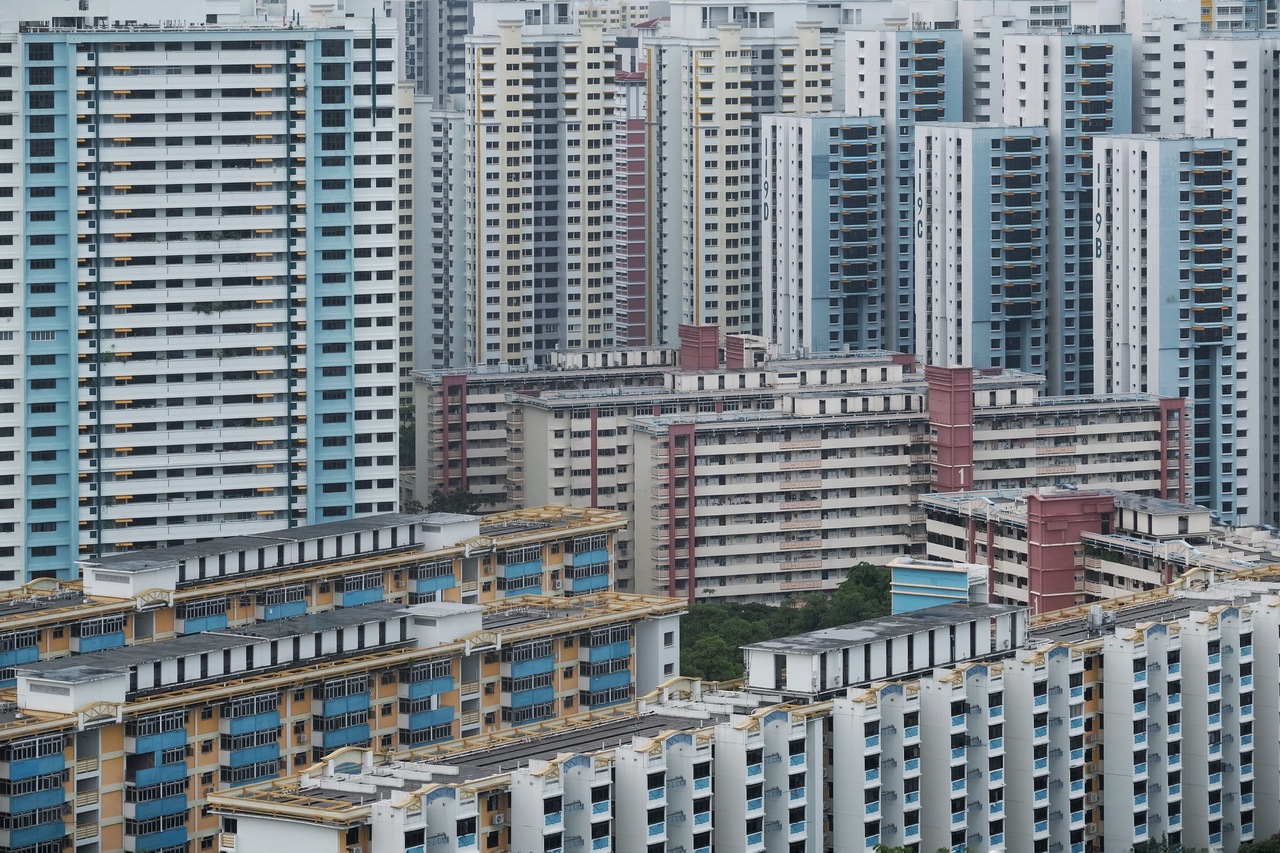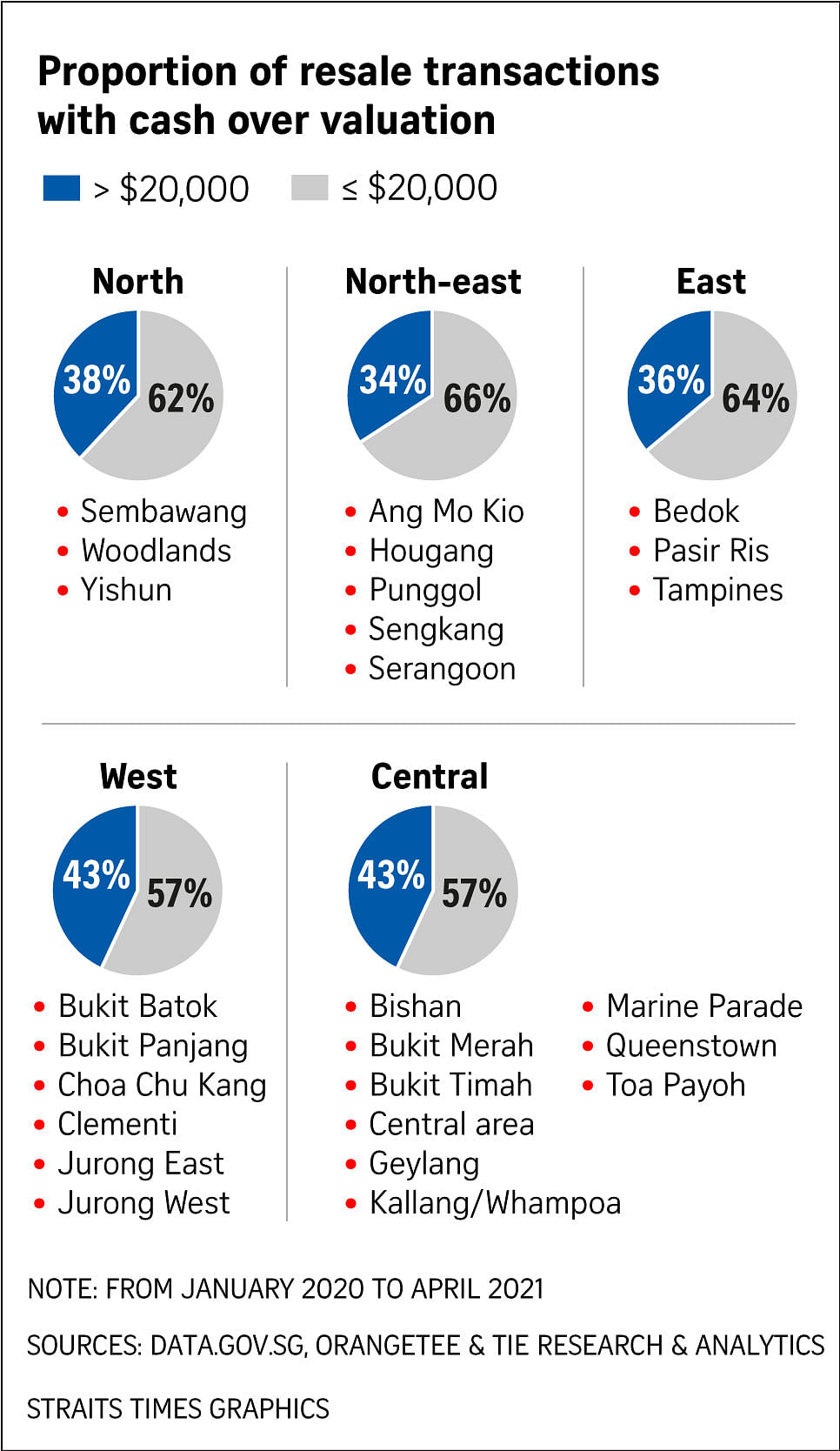1 in 3 HDB resale flat buyers paid cash over valuation this year, up from 1 in 5 in 2020
Sign up now: Get ST's newsletters delivered to your inbox

From January 2020 to April 2021, fewer than one in four resale flat buyers paid above market valuation for their flat.
ST PHOTO: GAVIN FOO
Follow topic:
SINGAPORE - Around one in three buyers of a Housing Board resale flat paid above market valuation this year, an increase from one in five last year.
The increase came against the backdrop of steadily rising prices for such flats.
The median cash over valuation (COV) paid by buyers remained at $0 each year, figures released by the Ministry of National Development (MND) as part of a written parliamentary reply last Monday (July 5) showed.
But the proportion of buyers who paid a COV increased, reflecting the current broad-based demand for housing, including in the private housing market, supported by the low interest rate environment, said MND.
COV happens when a resale flat is sold above its actual HDB valuation, and the difference can only be paid for in cash by the buyer.
If buyers and sellers have agreed on a resale price that is equal to the market valuation of the flat, buyers do not have to pay a COV.
From January last year to April this year, fewer than one in four resale flat buyers paid above market valuation for their flat, said MND in another written parliamentary reply last Tuesday.
Among these, about six in 10 buyers paid a COV of not more than $20,000, while the remaining four paid more than $20,000, data from MND showed.
In the 16-month period, about 34,600 resale flats changed hands, said Ms Christine Sun, senior vice-president of research and analytics at OrangeTee & Tie, citing HDB data.
This translated to about 8,600 buyers who paid a COV, and among these, around 3,400 paid more than $20,000 COV, Ms Sun added.
"Whether $20,000 COV is high or low depends on the base price. For a $1 million flat, maybe it's reasonable. For a $300,000 flat, it's quite substantial. We need more detailed data to properly gauge if the COV is considered high and how many people are impacted," she said.
Mr Alan Cheong, head of research and consultancy at real estate firm Savills, concurs that more data on COV is needed to paint a full and accurate picture.
For instance, the number of buyers who paid a COV may drastically increase if the time frame started from the third quarter of last year instead of the first quarter, he noted.
This is because the resale market was "still sleeping" in January last year, and resale prices started "accelerating" only in the third quarter of last year, when Singapore came out of a two-month circuit breaker period in June 2020, said Mr Cheong.
HDB stopped publishing data on COV after 2013.
MND noted that HDB resale transactions are conducted on a "willing-buyer, willing-seller" basis, with prices negotiated and mutually agreed on between both parties.
In its reply last Monday, MND said that the current proportion of buyers who paid a COV is "significantly lower" compared with the period between 2010 and 2013.
Then, almost all HDB resale buyers paid a COV, MND added.
This is because the practice then was for sellers to obtain a valuation from HDB, and negotiate a COV with the buyers to determine the resale price.
Since 2014, the rules have changed.
Currently, both parties have to first agree on the resale price before obtaining a valuation from HDB, which will determine the loan amount and CPF savings that can be used for the purchase.
Should buyers choose not to proceed with the transaction after obtaining the valuation - and asserting the COV payable - they will have to forgo the option fee of between $1 to $1,000 paid to the seller.
Dr Sing Tien Foo, director of the Institute of Real Estate and Urban Studies at the National University of Singapore, said the COV rule change may have resulted in "wider variations" in pricing, especially where there is keen competition on choice units.
"Buyers may overpay due to lack of reference point, in terms of valuation information," he noted.
ERA Realty head of research and consultancy Nicholas Mak said the current bullish resale market naturally lends to a higher COV, as demand for resale flats outstrip supply.
Long construction delays plaguing Build-To-Order (BTO) projects, as well as increased numbers of returning overseas Singaporeans and new permanent residents have driven up demand for resale flats, he said.
As a result, rising COV may price out those who are not "cash rich", Mr Mak added.
"Unfortunately, the rising COV will continue to accelerate resale prices because the next round of valuation is based on transacted prices so it will push prices upwards."
As Savills' Mr Cheong put it: "Valuation is done based on past transactions, but sellers look forward to projected prices. So when the market starts rising, sellers will ask for higher COV and buyers will anticipate paying more COV."
In June, HDB resale prices rose for the 12th straight month, with prices now just 1.7 per cent off their peak in April 2013, according to flash data from real estate portal SRX released on July 8.
Analysts interviewed forecast that, at the current trajectory, HDB resale prices would likely reach a new record in the second half of this year.
Unfortunately, Mr Cheong said there was not much buyers and sellers could do, besides to "wait it out".
"The Government may intervene but that would be interfering with market forces and it comes with a lot of side effects. So until the supply chain reverts to normal and the Covid-19 induced disruptions are worked out, there's really not much we can do about it."


